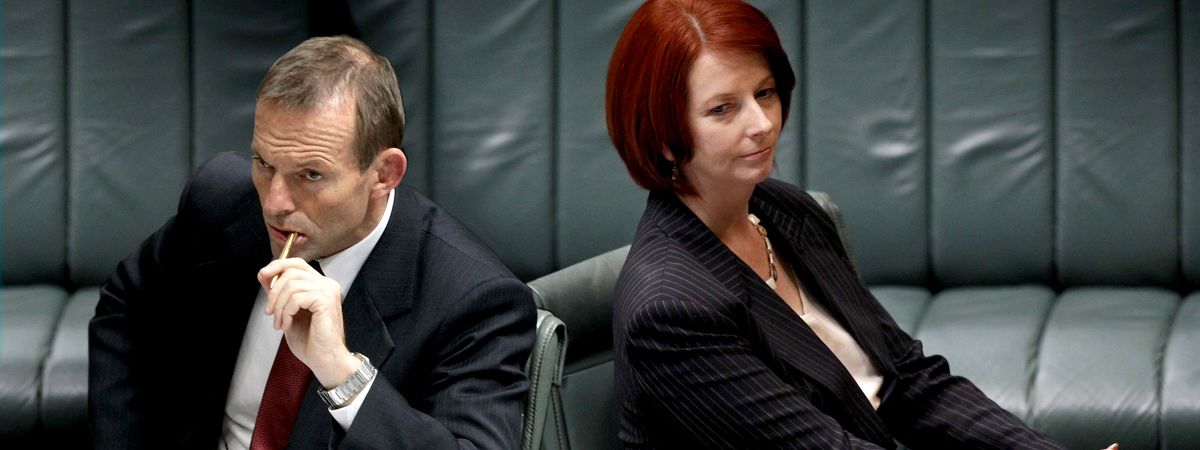Elections are a form of peer-group pressure, in which leaders are bullied into being as small-minded as the public at its worst. Yet voters are not so stupid that they can’t see their knees being jerked. In 2010 Julia Gillard and Tony Abbott broke the democratic contract with a campaign so awful that it begged a collective rebuke.
I hadn’t seen anything like it in more than twenty years of covering national affairs. It was a flip of a coin who was the more annoying: the robotic prime minister or the relentlessly negative Opposition leader. I wanted to pen a resignation letter to my employer: “Dear Rupert, sorry, I can’t pretend that this contest is worth reporting. Neither candidate deserves to win. Julia won’t talk the country up; Tony keeps talking it down.”
Two amiable and intelligent politicians had frozen, together. They delivered no memorable quotes, let alone policies – merely slogans that quickly became punchlines at their own expense: “moving forward” and “the real Julia” versus “stop the boats” and “end the waste.”
The quick, and romantic, conclusion to draw is that the people willingly smashed the machine by choosing none of the above on 21 August. To borrow one of Kevin Rudd’s better mantras, Australia declared that this reckless style of campaigning must stop. That may be true, but I wouldn’t take the next step and assume that a hung parliament is the solution to a crisis of governance that has been a decade in the making.
Today there is a whiff of the conflict-ridden 1970s in the air. The main parties have nothing to offer their supporters beyond conspiracy theories about their opponents. Labor blames the media and a bloody-minded Opposition for the shrill tone to the national conversation. The Coalition points the bone back at Labor, which it accuses of being the worst government in history.
Business and organised labour have assumed the right of veto over policies they don’t like, and they spend millions in advertising to make their point. News organisations engage in turf wars, most notably the ABC and the Australian. The media reflect and reinforce the malaise through the restless search for another scandal to fill the 24-hour news cycle.
The election year felt like one long domestic dispute. The row didn’t end with Rudd’s dumping as prime minister; it just took another screwy form as Gillard and Abbott competed for the right to shrink the nation. In no previous post-war campaign had both sides agreed to reduce the immigration intake regardless of the economic cycle. Ben Chifley and Robert Menzies would turn in their graves if they knew their political grandchildren could be so easily intimidated by public opinion.
The extraordinary thing is that Australia has never looked more appealing to the rest of the world. Whenever a government minister attends an international forum, the first question they are asked is, “How did you guys do it?” By this the questioner means: how did we avoid the global recession?
The 2010 campaign was the sound of a nation needlessly fracturing. Each side of politics clung like a barnacle to its version of reality. It is rare for the main parties to talk themselves into opposite corners of a room. One or the other has usually had a strong enough sense of where the majority sits to lay claim to it. But Gillard and Abbott, and behind them their poll-obsessed teams, were so terrified of offending the disengaged that they forgot to inspire the voters who were paying attention.
The Australia that revealed itself at the ballot box on 21 August was split every which way. Between the mining states and the southern states. Between men and women. And between old and young. The criss-cross of moods sent two unmistakable messages. To the Liberal Party and its coalition partner, the Nationals – Australia still leans centre-left, even in the bush. To the Labor Party – you blew it.
CONTINUE READING
This is an extract from George Megalogenis's Quarterly Essay, Trivial Pursuit: Leadership and the end of the reform era. To read the full essay, subscribe or buy the book.
ALSO FROM QUARTERLY ESSAY












